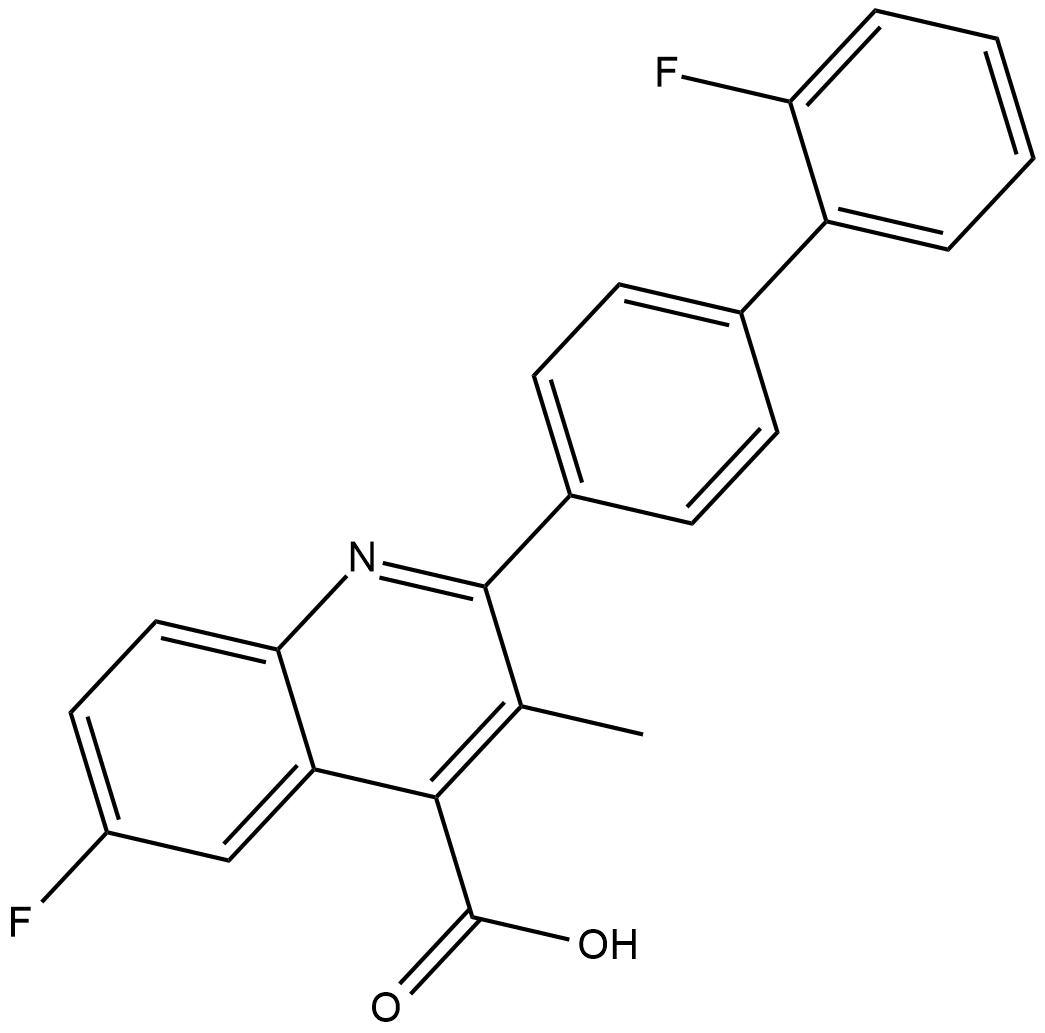Brequinar (Synonyms: NSC 368390) |
| Catalog No.GC19082 |
Brequinar is a potent inhibitor of dihydroorotate dehydrogenase, with potent activities against a broad spectrum of viruses.
Products are for research use only. Not for human use. We do not sell to patients.

Cas No.: 96187-53-0
Sample solution is provided at 25 µL, 10mM.
Brequinar is a potent inhibitor of dihydroorotate dehydrogenase, with potent activities against a broad spectrum of viruses.
Brequinar reduces virus progeny production by >90%, with EC50 of 17 nM. Brequinar (5 uM) also inhibits other orthopoxviruses, and blocks virus DNA replication. Brequinar does not affect virus early gene expression, but has a severe effect on the late stage of the virus cycle[1]. Brequinar reduces the level of envelope protein production and the viral titer in a dose-dependent manner, with EC50 of 78 nM in the CFI assay. Brequinar (5 uM) inhibits viral RNA synthesis. Brequinar has antiviral effect, but the effect is reversed by pyrimidine. Brequinar-resistant viruses can be selected in cell culture. Brequinar (5 uM) suppresses the luciferase activities from both the WT and NS5 mutant replicons[2]. Brequinar sodium effectively prevents the increase in PyNTP levels with an IC50 of 0.26 uM. Brequinar sodium effectively inhibits cell proliferation with an IC50 of 0.26 uM. Brequinar sodium inhibits autophosphorylation of p56lck with IC50 of 70 uM; inhibition is 39, 41, and 60% for 25, 50, and 100 uM Brequinar sodium, respectively. Brequinar sodium also inhibits the phosphorylation by p56lck of the exogenous substrate, histone 2B, with an IC50 of 70 uM; inhibition is 10, 43, 59, and 86% for 25, 50, 100, and 200 uM Brequinar sodium, respectively. Brequinar sodium inhibits autophosphorylation of p59fyn with an IC50 of 105 uM; inhibition is 0, 17, 48, and 65% for 25, 50, 100, and 200 uM Brequinar sodium, respectively. Brequinar sodium also inhibits the phosphorylation by p59fyn of histone 2B with an IC50 of 20 uM; inhibition is 26, 54, 79, 83, and 84% for 10, 25, 50, 100, and 200 uM Brequinar sodium, respectively[3].
Brequinar sodium-treated (10-20 mg/kg/day) mice has a 31% reduction in percentage of packed cell volume compared with untreated BALB/c mice. Brequinar sodium reduces UTP and CTP levels in bone marrow cells by 30 and 25%, respectively. Brequinar sodium (10-20 mg/kg/day) in combination with uridine (1000-2000 mg/kg/day) prevents anemia, and the hematocrits remain at levels (61-63%) comparable with those of untreated controls[3].
References:
[1]. Schnellrath LC, et al. Potent antiviral activity of brequinar against the emerging Cantagalo virus in cell culture. Int J Antimicrob Agents. 2011 Nov;38(5):435-41.
[2]. Qing M, et al. Characterization of dengue virus resistance to brequinar in cell culture. Antimicrob Agents Chemother. 2010 Sep;54(9):3686-95.
[3]. Xu X, et al. In vitro and in vivo mechanisms of action of the antiproliferative and immunosuppressive agent, brequinar sodium. J Immunol. 1998 Jan 15;160(2):846-53.
Average Rating: 5 (Based on Reviews and 3 reference(s) in Google Scholar.)
GLPBIO products are for RESEARCH USE ONLY. Please make sure your review or question is research based.
Required fields are marked with *




